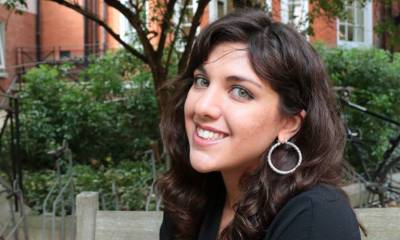Claudia Cannavo, PhD student, UCL Queen Square Institute of Neurology

Claudia Cannavo, from Italy, is a PhD student studying at UCL Queen Square Institute of Neurology.
1. What is your educational background?
I studied Classics in high-school in Italy and then moved to Manchester to start my Bachelor in Neuroscience at The University of Manchester. During this time I did a one-year internship at Mayo Clinic (Florida, US) where I worked on apoE in Alzheimer’s disease. I graduated with a first-class degree and did a one-year Masters in Integrative Neuroscience at the University of Edinburgh, before starting a three-year PhD at UCL on Down’s syndrome and Alzheimer’s disease.
2. What are your motivations for pursuing a PGR?
I am deeply interested in neurodegeneration, in particular Alzheimer’s disease, and I want to contribute to the research in this field. In addition, I like challenges and I believe a PhD is a great opportunity for personal and professional development.
3. What do you find interesting about your field of study and what inspires you?
I am fascinated by the correlation between molecular biology and cognition; in other words, by how dysfunctions at the molecular level result in the behavioural and cognitive changes that we observe in the disease. I am inspired by the curiosity of dissecting this link and by the hope of finding a cure.
4. What are your career plans once you’ve completed your current programme of study at UCL?
I am thinking of undertaking a post-doctoral position in a laboratory that is relevant to my area of interest, possibly abroad.
5. Do you think studying at UCL Faculty of Brain Sciences is a good investment?
I definitely think so. First of all, for its great scientific community; and secondly since it is so well-known for the science it produces. I expect it will be easier to lead towards my desired career path.
6. Have you undertaken any networking opportunities either as part of your degree or outside of your studies?
I have been trying to take part in as many conferences, meetings, social events that are relevant to my field as I can. I think this is important for both work and at a personal level, since I believe that human relationships are a fundamental part of everyone’s experience in a specific place and time in life.
7. What is it like studying in London and how do you think it has benefited your studies?
The best part about studying in London is the networking opportunities it offers. It is extremely easy to meet people that work in similar areas. Sharing expertise and facilities is truly invaluable.
8. How do you think the system of learning/researching at UCL differs from that in your own country?
I deeply appreciate the meritocracy and transparency that characterise learning and research at UCL and, more generally, in the UK. At UCL, I experienced a spirit of cooperation that I believe is essential in science but not so easily found.
 Close
Close

